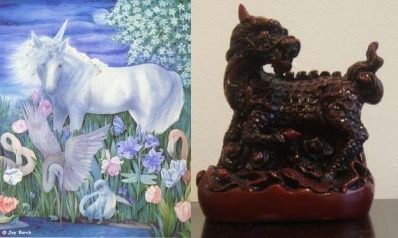BACKGROUND INFORMATION
The First Unicorns
In Chinese mythology, the Unicorn was an animal of good omen that came to humans only on important missions. Its appearance was interpreted as a sign of good times, and the fact that it has not been seen in many centuries suggests that we are living in "bad" times. It will appear once again when the time is right and when goodness reigns.
One of the first Unicorns is said to have appeared almost 5,000 years ago to give Emperor Fu Hsi the secrets of written language. Then, almost 4,700 years ago in 2697 B.C., another Unicorn made an appearance in the garden of the Yellow Emperor (Huang Di). This auspicious omen was seen by the emperor as a sign that his reign would be long and peaceful. Two Unicorns also lived during the reign of Emperor Yao, the fourth of the Five Emperors who shaped the world 4,000 years ago.
The Chinese also believed that the Unicorn could foretell the birth of great men like the philosopher Confucius. In 551 B.C., Confucius' pregnant mother met a Unicorn in the woods. It gave her a small piece of jade and placed its head in her lap. She realized the importance of the event and knew it was a good omen from the gods.
An inscription on the piece of jade told of the great wisdom her son would possess; and, sure enough, Confucius became the most respected of all Chinese philosophers. Even today, 2,500 years later, his prophetic words are still honored and revered. In his old age, Confucius reportedly saw the Unicorn for himself and knew that it meant he would soon die.
Types of Unicorns
There are basically two types of unicorns: the eastern unicorn and the western unicorn. The eastern unicorn is believed to be the first unicorns described by the Chinese as a miraculous creature called the Ch'i lin (or K'i lin), a "great unicorn," that radiated exquisite colors, had a voice like a thousand wind chimes, avoided fighting at all costs, lived for a thousand years, and had a horn twelve feet long. It was said that Ch'i lin walked so softly its hooves made no sound. Some believed this was because it was so soft-hearted it did not want to crush the blades of grass beneath its feet. The western unicorn is the typical white, pure, kind-tempered, playful unicorn that most of us know of.

